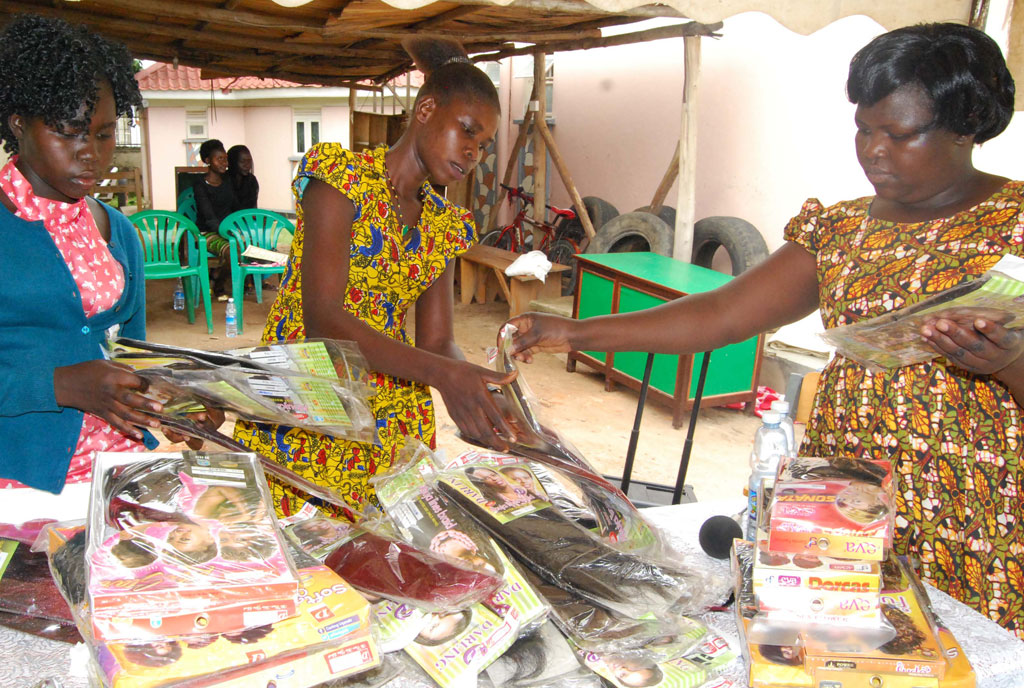W.Nile leaders to turn refugee presence into urban opportunities

Some of the refugees sorting saloon items in Arua after they were trained in the City by Rural Initative for Community Empowerment on salon skills. PHOTO/FELIX WAROM OKELLO.
The leaders in the West Nile sub-region that is hosting over 700,000 refugees -in various settlements- have agreed to turn it into opportunities.
The leaders agreed during the dissemination of a survey conducted by the Netherlands organization, VNG at Muni University in Arua City. They said they want to change the narratives of refugees being a burden to meagre resources to instead tap into the economic skills that especially the urban refugees and forced migrants have.
According to the 2022/2023 survey conducted by Urban Action Lab of Makerere University in Arua City, Koboko Municipality and Gulu City, the areas are home to over 87,000 urban refugees and forced migrants.
The VNG Resident Program Manager for Sam Ejibua, said: “Refugees are not a new phenomenon especially in West Nile but we should labour to make them have better lives.”
He said the new surveys that have come up with proper figures of urban refugees and forced migrants, should enable the ministries and local governments to plan for them.
“These people have enormous skills which we can tap into. They have created more business opportunities because there is now high demand for food in the urban centers due to their presence,” he observed.
As a result of the urban refugees and forced migrants living in Arua City and Koboko Municipality, prices of rent have been hiked. For instance, a four-roomed house in Arua City where a South Sudan refugee rents, is charged Shs600,000 per month. This is usually different from when a Ugandan national is renting for about Shs 400,000.
Their presence has also attracted flow in cross border business where fish from South Sudan are transported to Arua City in large quantities to meet the growing demand for fish.
Other food items like tomatoes, potatoes, cassava, onions and cabbages have gone on high demand due to the increase in population, resulting from the urban refugees. In schools, the refugees are charged different fees rates with the nationals, hence profits.
The Refugee Desk Officer at the Office of the Prime Minister (OPM) Solomon Osakan, said: “Even in the settlements, we have asked refugees to rent land privately for farming because of growing demand for food. This has opened economic opportunities for landowners who are now getting money from renting their land.”
Explaining why the refugees registered in the various settlements are running away to urban centers Osakan remarked: “These people are looking for better schools, hospitals, economy, especially banks and forex bureaus, social amenities which they cannot get in the settlements. And this has offered turnaround opportunities for businesses in the urban centers.”
The UNHCR Head of Sub-office in Arua, Paul Kenya, said: “We need to demystify negativity that they are a burden in urban centers. Let us be creative and have meaningful partnership with local governments in providing assistance.”
In Koboko Municipality, some of the skilled refugees have been employed on a local arrangement.
The Vice LC5 Chairperson for Terego District Sunday Ayikoru, said: “During food distribution, you will see fleets of vehicles in the settlements loaded with food returning to Arua City or heading to Koboko whether for sale or not. We only need proper planning in terms of an increase in budget by the government to limit the straining of little resources.”
The Refugee Act that is undergoing amendment, does not recognize urban centers harboring urban refugees with exception of Kampala City. The district leaders in West Nile have since been asking the government to increase funding especially to refugee hosting districts because of straining of resources like water, roads, schools and medical supplies in vain.
An assistant commissioner in the local government ministry, Stephen Koma, called for more support to “Uganda’s open door policy to refugees with proper collaboration in planning and budgeting for refugees.”
On his part, Koboko Municipality Mayor Wilson Sanya wants what he described as “a clear policy on urban refugees and forced migrants.”




